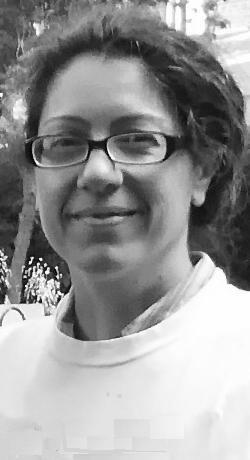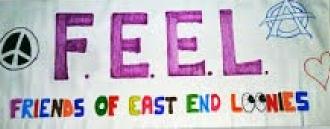Ravaged Wonderful Earth - A Collection for David Kessel
ContentsPoems by David Kessel indexed in red Cover picture: 'Space babies' by John Zammit Summer Rain 2000 The Songthrush 1988 A Friendship by Nick Waller For Zoe 1987 An appreciation from a friend by Sarah Barratt Life Against Death 1999
Poems by Frank Bangay For David Peace and Love
From: A Cup of Burnt Brazil by Howard Mingham Review of Howard Mingham's Collected Poems by Richard Owens Mike Mosley 1991 Outsider Poetry by David Amery Ravaged Wonderful Earth, a poem by David Amery A schizophrenic cosmology by Tim Pearson
Friends of East End Loonies (F.E.E.L.) 1. Birth of FEEL by Myra 2. Long Live Anarchism! by Nat
Old Man Commercial Road. A poem by Stephen Watts
Poems by Christina Viti In a City Square Appeal
In The Silence. A poem for David Kessel by Shamin Azad New Cross 1984 Here and There. A poem by Chris Gutkind
Poems by Mike Parsons Daytrip To Broadstairs Hope and the Empties.
Plastered in Plaistow. A poem by Spider Evans of Eastbeat Who or What is she? A poem by Adjoa Rhonda Abraham of Eastbeat It All Depends. A poem by John Clarke Bitter 2010 Poetry, Parsnips and Schizophrenia by Peter Barham My Youth 1993
Poems by Alan Morrison O The Windows of the Bookshop Must Be Broken A Letter from David Kessel
Poems by John Zammit Voices from the Ocean Deep The Whaler's Ghost
Ruby Courage 2008 |

A crouched back, under the weight of the usual backpack; a jeans jacket and a t-shirt with a stain or two, please let me introduce you to the unique David Kessel. Here he is in May 2017 buying a curry from Mr Mo in the Shalamar Kebab House in Whitechapel. "I have been coming here for the past 25 years!!!" he tells us. He kindly offers us some of the leaflets that he religiously carries with him, including some of his poems, with titles like 'In memorium Salvador Allende', 'Lament for a Taliban Lad', 'Ruby Courage', 'Hillside, Llangattock'. With the poems comes an invitation to meetings of the Friends of East End Loonies, also known as F.E.E.L., in nearby Fieldgate Street. (Nathalie Fonnesu) Ravaged Wonderful Earth, on which this web feature is based, was an introduction not only to David but to his circle of creative friends, including the photographer Nathalie Fonnesu.
|
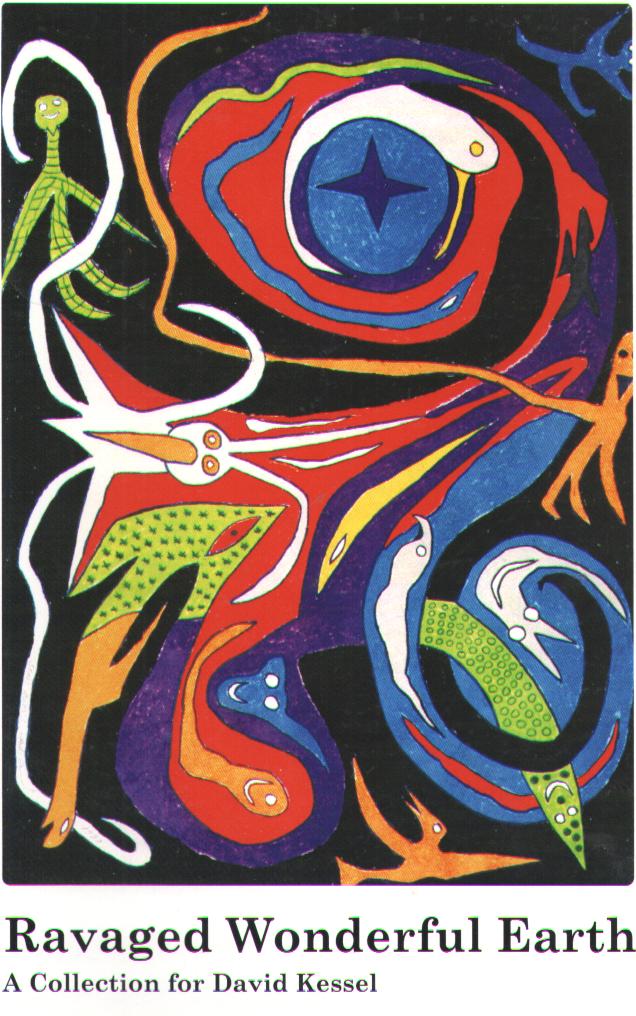
|
| Last year I went with David [Kessel] to a book launch of poems by a friend of his who died some years before - Howard Mingham. It was a small event, held at the News from Nowhere Club, with a few people who had known Howard. The poems themselves were original and startling, but the story of their publication was itself astonishing. Howard was a young man who had been brought up in Hackney, suffered from schizophrenia, wrote poems and went to a local writers group. He died in 1984 after falling from his balcony aged only 32. His work received little recognition and no collection of his poems had been published. But David kept onto the poems for almost thirty years, showing them to anyone who would be interested, holding onto a faith that they deserved to be more widely known. Eventually, with the help of Alan Morrison, he achieved their publication. It is a remarkable tribute to David's loyalty to his friend and to his faithfulness to his poetry. |
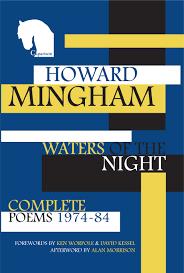
|
Sitting at the book launch I was reminded of another outsider artist, the painter Alfred Wallis, whose story I had read some months earlier while on holiday in St Ives. Wallis was a retired sailor and rag-and-bone merchant who took up painting at the age of 70 after the death of his wife. He had no training, and painted pictures mostly of ships using ordinary ships paint or whatever scraps of wood or cardboard he could lay his hands on. By this stage in his life he was a complete loner and local eccentric, living in desperate poverty and increasingly isolated. By sheer coincidence he was seen painting - through his front window - by two young artists on a day trip to St Ives, and through their influence his work began to have some recognition in the art world. But this meant little to Wallis who died in the local workhouse in 1942. A small group of artists - and no one else - paid tribute at his funeral, and because there was no money for his funeral he was given a tombstone in ceramic by the potter Bernard Leach, with the design of a lighthouse. I found his tomb in the cemetery at St Ives, hidden away among the rows of his poor neighbours on the hillside overlooking the sea, and by an irony just a hundred yards from the Tate gallery where some of his work is now on show.
When I try to define what is important in outsider artists like these - and I should say I consider David himself as one of them - it is more than saying that these are artists who deserved wider recognition but sadly didn't receive it (at least in their own lifetime). Of course their stories remind us of the power nexus of the artworld where who is recognised and who is not is determined by the powers that be on the usual class, establishment, conformity to the status quo grounds. But outsider artists are important also for other reasons. What distinguishes outsider art, and means that perhaps it will never be "fashionable", is that it is driven by an inner compulsion which doesn't cater for any audience or market. Another term for it is "raw vision", it doesn't set out to please anyone, it is more of an existential life and death battle. You can see this in David's poetry, although it is often lyrically very beautiful, the beauty arises from the starkness of its struggle, the thrush's song "stark and steadfast as solitude". What outsider artists offer is a view "from outside", that is a perspective on the world that is often at odds with the conventional one. But the outsider view may be the truer one. I often think that the intense paranoia of some outsider perspectives offers a more accurate picture of the world we live in than the dulled and complicit worldview of so much establishment poetry. They alert us to the fact that global forces are at work in the world, even if they cannot always name them.
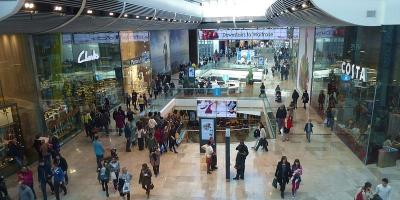 Westfields Shopping City, Stratford,
photographed by Cmglee. Opened 13.9.2011, in time for the
2012 Olympic Games
Westfields Shopping City, Stratford,
photographed by Cmglee. Opened 13.9.2011, in time for the
2012 Olympic Games
|
These forces are particularly evident in the East End, which seems in many ways to be on the front line, with the infiltrating dominance of the financial sector at Aldgate and in Docklands, the erosion of working class solidarity and the closure of East End pubs, and the colonisation of consumerist cancer in Westfields. It may be that being paranoid is just being more sensitive to these intrusions that the majority have become dulled to. |
One of my favourite of David's poems is 'A Mug of Black Coffee'. The situation is common enough, he is sitting in a seaside cafe, in a June hailstorm, with a bacon butty and a coffee. You can imagine what an establishment poet might make of this, some whimsical comment on the English summer, some nostalgia about seasides of his childhood, but it would be just as familiar and dull as an old song. David's poem is disorienting from the very beginning. How can a fury be "listless" and how can it be in his right foot? It undermines our own sense of identity from the start. Each line then adds layers of instability and menace, but it all seems too much for the situation. The whole poem gives an excess of significance that we can't keep within the tidy confines of what is comfortable, what we would expect. In truth it is not a description of a day at the seaside, if that is what we are looking for we will be disappointed. Too often poetry is content to package up feelings that are already familiar, to give us back what we already know. This poem is a rush of subjectivity, creating significance at a furious pace. The writers Deleuze and Guattari (who wrote of Capitalism and Schizophrenia) described the unconscious as a creative factory in constant production, and that is what we see here. The subjectivity opens up as something new and fresh, it is like a view "from outside".
Guattari, (who worked for many years at a radical mental health community near Paris) wrote of 'The Three Ecologies': that is to say, the ecology of the planet, the ecology of society and the ecology of human subjectivity. All three are important, he says, and all three are under critical attack from what he calls Integrated World Capitalism. You only have to spend a few minutes in Westfields to feel the force of this attack on all three levels. A place like this, with its overpowering consumerism, represents a clear threat to the planet; it is also a corrosive intrusion into the social fabric of East London. But above all it is a crushing assault on any lingering subjectivity through its massproduced sensory overload, a constant barrage of desirable objects, video ads and muzak that gives you no time to think. Of course the three levels are all connected, and Guattari argues that resistance to the assault on subjectivity is just as important as resistance on the other two levels. What outsider poetry can offer is subjectivity in a very pure form, and that is what we need to help us resist the overwhelming assault.
Reading poetry such as David's doesn't simply open a window onto someone else's subjectivity, it also expands our own. The danger is that we shrink back into our own isolated subjectivities, oppressed by the triple assault of Westfields and other forces. The only answer is to share our subjectivity with others, even on a small scale. Although we cannot overturn the forces of oppression we can open a space to escape them by sharing our subjectivities with a few others. Hopefully this is something we can do with this small collection.
Friends of East End Loonies (F.E.E.L.)
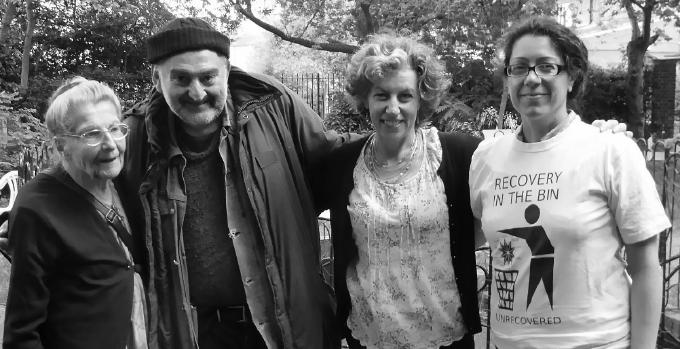
|
1) The Birth of F.E.E.L. by Myra Garrett
FEEL was created out of one of those interminable discussions in a group trying to come up with a change of name. The Friends of St. Clements was a well established identity when the mental health services based in the hospital by that name moved to a new site. As the base was no longer St. Clemcnts, it seemed reasonable to reflect that in a change of name. In the end we came to the boring conclusion to add "at Mile End Mental Health Unit" to our name.
But, the Friends of East End Loonies, a name created by David Kessel was already embedded in the minds of enough people to result in a life of its own. This small group had a few meetings in an ideas store and moved on to a monthly booking at the London Action Resource Centre (LARC). Lots of idees about more radical activities have been discussed, but interestingly we decided to make a platform for radical thinkers in mental health so they could be hear: by a wider group of locals. We began organising evening meetings with food music and poetry to encourage people to come together. Speakers have included Rufus May, Joanna Moncrieff, Bob Johnson - all professionals who have strong views about the injustices and ineffectiveness of current practice in mental health.
The FEEL meetings are called under the banner "Humane Therapy -- Not Drug Tyranny" and attract sometimes quite large audiences to hear about real alternatives to the pharmaco-custodial model of current psychiatric practice, This term devised again by David Kessel, who has played a consistent and creative role in the life of FEEL. He created the by-line for the group - East Enders deserve humane asylums and freedom from the chemical cosh - which remains the motivating force behind the group.
FEEL continues to meet with the inspiration of David very much at its heart. He is disappointed that we have not organised big protests, circulated masses of leaflets, or held lots of street meetings. But, we carry on in our own small way to spread the messages from inspiring people with alternative ideas and practices which move us towards the humane therapy we demand, and David started it all.
2. Long Live Anarchism! by Nathalie Fonnesu
Friends of East End Loonies (F.E.E.L.) met for the first time in November 2007. David and Myra invited people to gather at the Idea Store ir Whitechapel and consider the possibility of starting a regular discussion group. Ros and myself joined them and by the end of the evening a new date was arranged for the following month. The campaign for humane and safe: mental health procedures opposed to the heavy drugging and coercion specially applied to inpatients, had started.
Ever since, several dozens of people have been participating in the monthly meetings at the London Action Resource Centre (LARC) and the very popular events at the Kingsley Hall. Every gathering has been the occasion of animated discussions, reinforcing the spirit for the crusade of many patients carers and service providers for saner recovery strategies. F.E.E.L. have also been honored to host talks of remarkable minds such as Rufus May, Dr Bob Johnson, Dr Johanna Moncrieff, Dave Skull, Prof Roland Littlewood, Peter Barham and many more.
Some people didn't appreciate the "loonies" bit in the group name; many love it. Others wished to bring new ideas on how to improve the group, grow and offer better services. The wonder was if F.E.E.L. was going to duplicate or resemble other groups or organisations; perhaps it wouldn't any longer have been F.E.E.L. if all those changes had taken place.
My personal involvement with F.E.E.L. has been one of my most valuable life experiences to date. I was allowed to freely create and write on a blog and Facebook page, while networking with other inspiring activist groups like Mad Pride, the Survivors History Group, Bipolar Explorers, Tower Hamlets Africa and Caribbean Mental Organisation (THACMO), the Mental Health Resistance Network, Speak Out Against Psychiatry, to name a few. It also gave me the chance to research and understand more in depth my condition of bipolar disorder.
Andrew Roberts likes to hear from users:
To contact him, please
use the Communication
Form

